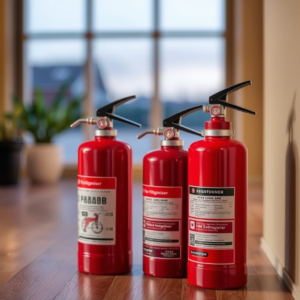As a landlord, ensuring fire safety is a crucial responsibility you cannot ignore. In addition to ensuring your tenants’ well-being, protecting your property from fire is crucial for minimizing risks. This brings up a significant question for property owners everywhere: Is a fire extinguisher for rental property necessary?
This blog provides landlords with crucial insights about fire extinguisher requirements for rental properties, the benefits of having a fire extinguisher for rental property, and best practices for ensuring fire safety. Whether you’re managing a multi-unit building or a single-family home, here’s everything you need to know.

Legal Requirements for Fire Extinguishers in Rental Properties
Fire extinguisher regulations can vary based on your location, but compliance isn’t optional. Understanding the fire safety laws for rental properties is critical to avoiding penalties and ensuring tenant safety.
- Local, State, and National Regulations
Fire safety requirements are often outlined at the local, state, or national level. Some regions enforce mandatory fire extinguisher placement in all rental properties, while others might only require them in specific scenarios, such as multi-unit dwellings or commercial rentals.
- When Are Fire Extinguishers Mandatory?
In numerous jurisdictions, fire extinguishers must be present in high-risk locations such as kitchens, hallways, or in proximity to exits in multi-unit buildings. Commercial leases or multi-story buildings might require them on every level.
Pro Tip
Contact your nearby fire department or housing agency. They can clarify the fire safety regulations relevant to your property.
Benefits of Having a Fire Extinguisher in Rental Properties
Even when fire extinguishers aren’t required by law, they provide various advantages for both landlords and tenants.
- Protecting Lives and Reducing Injuries
A fire extinguisher within easy reach can prevent small fires from escalating, protecting the lives of occupants and visitors.
- Minimizing Property Damage
Addressing fire damage is expensive and requires a lot of time. An appropriately positioned extinguisher can extinguish fires quickly, saving considerable amounts on repairs.
- Building Tenant Trust
Tenants observe when landlords place a high importance on safety. Supplying fire extinguishers shows you prioritize their safety, enhancing tenant satisfaction and retention.
- Potential Insurance Perks
Some insurance providers may lower premiums or make claims easier for landlords with proper fire safety measures in place, including extinguishers.
Types of Fire Extinguishers Suitable for Rental Properties
Not all fire extinguishers are created equal. Choosing the right type is essential for managing rental property fire risks.
- Classes of Fire Extinguishers
Fire extinguishers are classified into types that address different fire sources:
-
- Class A for combustibles like wood or paper.
- Class B for flammable liquids such as oil or gasoline.
- Class C for electrical fires.
- Recommended Option for Rentals
An ABC fire extinguisher is highly versatile, designed to handle most types of fires likely to occur in residential rental properties.
- Size Matters
Align the extinguisher’s size with the area it will cover. A compact extinguisher could be ideal for small kitchens, whereas bigger models are suitable for larger spaces.
Placement and Accessibility of Fire Extinguishers
Strategic positioning guarantees that your fire extinguishers are effective and accessible in emergencies.
- General Placement Guidelines
Position extinguishers in kitchens, hallways, near exits, or other high-risk locations.
- For Multi-Unit Properties
Every level of a multi-unit structure must have fire extinguishers clearly seen and reachable in shared spaces.
- For Single-Family Rentals
Prioritize placing extinguishers near the kitchen and exits, where fire risks are greatest.
Maintenance and Inspection of Fire Extinguishers
An overlooked fire extinguisher can be nearly as hazardous as not possessing one at all. Correct upkeep guarantees it’s prepared when required.
- Regular Inspections
Check extinguishers monthly for:
-
- Proper pressure levels.
- Visible damage or corrosion.
- An intact safety seal or pin.
- Professional Servicing
Arrange yearly expert evaluations for detailed assessments. Refill or substitute fire extinguishers as needed.
- Expiration Dates
Remember the expiration dates of your extinguishers and replace any that are expired without delay.
Educating Tenants on Fire Extinguisher Use
Even the best extinguisher is useless if tenants don’t know how to operate it. Empower your tenants with knowledge.
- Basic Training
Teach the PASS method:
-
- Pull the pin.
- Aim the nozzle at the base of the fire.
- Squeeze the handle.
- Sweep from side to side.
- Share Resources
Provide tenants with printed instructions or links to fire preparedness videos. Include this information in your tenant welcome packet or lease agreement.
Common Mistakes Landlords Should Avoid
Landlords often neglect several important elements of fire safety. Here are several traps to avoid.
- Failing to provide fire extinguishers where required by law.
- Choosing the wrong size or type of extinguisher for property-specific risks.
- Skipping regular maintenance, leading to malfunctioning extinguishers.
- Neglecting tenant education about proper extinguisher use.
Alternatives and Additional Fire Safety Measures
Although fire extinguishers are essential, an effective fire safety strategy incorporates additional resources too.
- Smoke Detectors
Verify that all rental units are equipped with operational smoke detectors in sleeping areas and shared spaces as required by regulations.
- Fire Blankets
An excellent addition for kitchens, fire blankets can quickly smother small fires.
- Sprinkler Systems
Though more common in commercial properties, sprinklers provide an added layer of fire safety for some larger residential rentals.
Fire extinguishers work best as part of this broader fire safety toolbox.
Make Fire Safety a Priority Today
Providing a fire extinguisher for rental property is one of the easiest and most impactful measures you can implement for tenant safety and safeguarding the property. Regardless of meeting legal obligations, protecting lives, or boosting tenant confidence, the advantages are clear.
Begin today by reviewing local fire safety standards and ensuring your property is equipped with the right fire extinguisher. Taking these steps can help you avoid the difficulties of selling a fire-damaged house and keep your property and tenants safe.
Previous